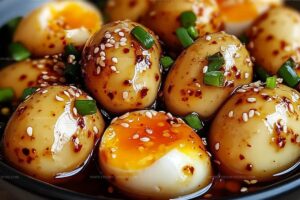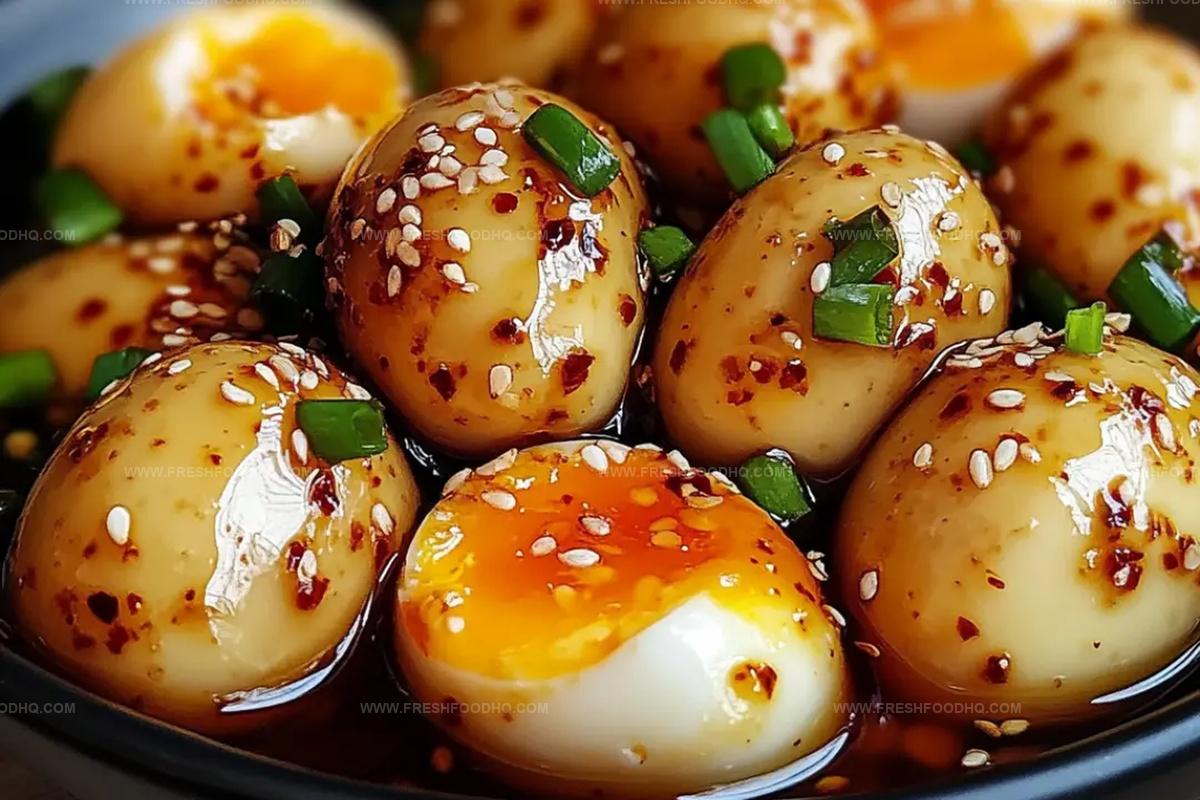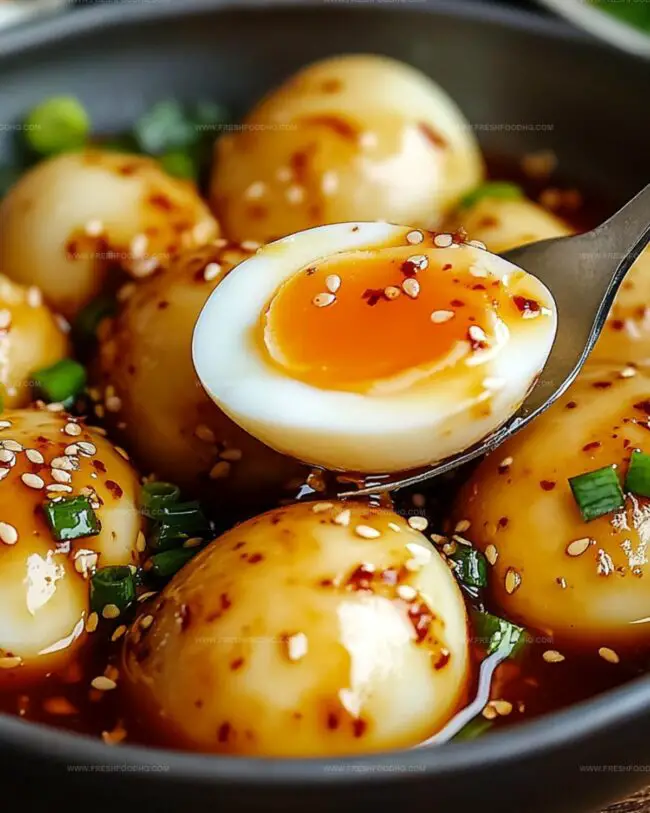Homemade Korean Mayak Eggs Recipe: Soy-Soaked Flavor Bombs
Nestled in korean cuisine, soy marinated eggs bring a remarkable burst of umami to any meal.
Soft-boiled eggs absorb deep, rich flavors from a savory marinade that tingles your taste buds.
Each bite promises a delightful balance between silky egg whites and perfectly seasoned yolks.
Delicate yet powerful, these eggs complement rice dishes, salads, and noodle bowls with incredible depth.
Home cooks adore this simple technique that transforms ordinary eggs into something extraordinary.
Salt, soy sauce, and subtle aromatics create a magical coating that makes these eggs irresistible.
Why Soy Marinated Eggs Make a Delicious Snack
Ingredients to Prepare Korean Mayak Soy Marinated Eggs
For the Protein Base:For the Marinade Components:For the Flavor Enhancers:For the Additional Ingredients:Detailed Steps to Marinate Soy Eggs Properly
Step 1: Boil Delicious Eggs
Fill a pot with water, ensuring eggs will be completely submerged. Sprinkle in some salt and vinegar.
Bring water to a rolling boil. Gently lower eggs into bubbling water.
Cook for 6 minutes if you want soft centers, or extend to 10 minutes for fully solid yolks.
Step 2: Chill Eggs Rapidly
Immediately transfer eggs from boiling water into a waiting bowl of ice water.
Let eggs sit and cool completely, which helps stop cooking and makes peeling easier.
Step 3: Create Flavorful Marinade
In a mixing bowl, combine:Whisk ingredients until sugar dissolves and everything is well blended.
Step 4: Marinate Egg Goodness
Carefully peel eggs, removing shell without damaging delicate surface. Place peeled eggs into a clean container.
Pour marinade over eggs, ensuring complete coverage. Seal container and refrigerate for minimum 6 hours, preferably overnight for maximum flavor absorption.
Step 5: Serve and Enjoy
Remove eggs from marinade. Slice or serve whole alongside steamed rice.
Drizzle with sesame oil for extra richness. Garnish with additional green onions if desired.
Tips for Achieving Perfect Soy Marinated Eggs Every Time
Variations to Customize Korean Mayak Soy Marinated Eggs
Perfect Accompaniments to Pair with Soy Marinated Eggs
Proper Storage Tips for Soy Marinated Eggs at Home
Place leftover marinated eggs in an airtight container and store in the refrigerator for up to 3-4 days. Keep eggs fully submerged in the marinade to maintain moisture and flavor.
Warm eggs gently in a microwave for 15-20 seconds or let them sit at room temperature for 10 minutes before serving to prevent rubbery texture.
Avoid freezing marinated eggs as they will lose their delicate texture and become watery when thawed. Fresh preparation is always recommended.
If the marinade looks cloudy or eggs smell off, discard immediately to ensure food safety and prevent potential bacterial growth.
FAQs
Mayak means “drug” in Korean because these eggs are so addictively delicious that people can’t stop eating them.
Yes, you can use light or dark soy sauce, but traditional Korean recipes typically use a Korean soy sauce for the most authentic flavor.
The eggs will stay fresh and flavorful for 3-4 days when stored properly in the marinade in an airtight container.
The spice level depends on how many chilies you add. You can control the heat by adjusting the number of chilies or omitting them completely.
Print
Soy Marinated Eggs (Korean Mayak Eggs) Recipe
- Total Time: 6 hours 15 minutes
- Yield: 6 1x
Description
Korean mayak eggs elevate breakfast with their silky, umami-rich flavor profile. Simmered in a savory soy marinade, these eggs deliver an irresistible blend of saltiness and depth that will draw you into a culinary adventure.
Ingredients
Main Protein:
- 6 eggs (room temperature)
Liquid and Seasoning Base:
- 1/2 cup (120 milliliters) soy sauce
- 1/2 cup (120 milliliters) water
- 1/2 cup (170 grams) sugar or honey
- 1 tablespoon white vinegar
- 2 teaspoons salt
Aromatics and Garnish:
- 3 garlic cloves, chopped
- 4 green onions, chopped
- 1 green chili, chopped (optional)
- 1 red chili, chopped (optional)
- 1 tablespoon sesame seeds
Instructions
- Prepare a pot with ample water, incorporating a pinch of salt and splash of vinegar to enhance egg cooking process.
- Bring liquid to rolling boil, then gently lower eggs into water using a slotted spoon, maintaining precise 6-minute cooking time for soft-boiled texture (or extend to 10 minutes for firmer consistency).
- Immediately transfer eggs into an ice water bath, allowing rapid cooling and preventing further cooking.
- Create marinade by whisking soy sauce, water, and sweetener until completely integrated.
- Incorporate minced garlic, chopped green onions, optional chilies, and toasted sesame seeds into the liquid mixture.
- Carefully peel eggs, ensuring delicate surface remains intact without tearing.
- Place peeled eggs into a clean, sealed container with sufficient depth to fully submerge them in marinade.
- Pour prepared sauce over eggs, guaranteeing complete coverage and even distribution.
- Seal container and refrigerate for minimum 6 hours, preferably overnight, enabling deep flavor absorption.
- Before serving, remove eggs from marinade and plate alongside steamed rice.
- Enhance final presentation with a delicate drizzle of sesame oil and optional sprinkle of additional sesame seeds.
Notes
- Experiment with soft or hard-boiled eggs based on personal texture preference, adjusting cooking time accordingly.
- Use room temperature eggs to prevent cracking and ensure even cooking during boiling process.
- Select high-quality soy sauce for deeper, richer marinade flavor and enhanced umami profile.
- Customize spice levels by adjusting chili quantity or using different pepper varieties like jalapeño or serrano for varied heat intensities.
- Prep Time: 15 minutes
- Cook Time: 6 hours
- Category: Appetizer, Snacks
- Method: Boiling
- Cuisine: Korean
Nutrition
- Serving Size: 6
- Calories: 118 kcal
- Sugar: 12 g
- Sodium: 1125 mg
- Fat: 7 g
- Saturated Fat: 1.6 g
- Unsaturated Fat: 5.4 g
- Trans Fat: 0 g
- Carbohydrates: 8 g
- Fiber: 0.3 g
- Protein: 9 g
- Cholesterol: 186 mg





Ethan Caldwell
Founder & Culinary Innovator
Expertise
Farm-to-table cooking, Seasonal recipe creation, Culinary storytelling, Food photography and styling
Education
The Chef’s Academy (Indianapolis, IN)
Ethan didn’t just fall in love with food, he grew into it, surrounded by fields, farmers’ markets, and family meals that told a story.
After sharpening his skills at The Chef’s Academy, he took his passion straight into the farm-to-table movement, working side-by-side with local growers and seasonal flavors.
He believes every recipe should feel like a walk through a summer market: colorful, fresh, and full of possibility.
Outside the kitchen, Ethan’s idea of a perfect day is hiking mountain trails, digging into heirloom vegetables, and hosting casual dinners where seconds are always encouraged.